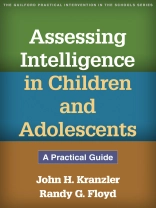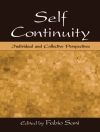Featuring reproducible forms, sample scripts, and other clinical tools, this indispensable book shows how to select, administer, and interpret evidence-based intelligence tests for a variety of purposes. It provides quick-reference guidelines for comprehensively assessing an individual K-12 student and sharing the results through effective written reports and in-person meetings. Basic concepts in intellectual assessment are concisely explained and the role of testing in a response-to-intervention framework is addressed. Discussions of intellectual disability and specific learning disorder reference DSM-5 criteria. Instructors praise the book’s suitability as a Cognitive Assessment course text. The large-size format and lay-flat binding facilitate photocopying; the reproducible materials can also be downloaded and printed for repeated use. This book is in The Guilford Practical Intervention in the Schools Series, edited by T. Chris Riley-Tillman. See also Contemporary Intellectual Assessment, Third Edition: Theories, Tests, and Issues, edited by Dawn P. Flanagan and Patti L. Harrison, which provides in-depth reviews of available instruments and assessment approaches.
İçerik tablosu
1. What Is Intelligence?2. How and Why Do People Differ in Intelligence?3. Ethics in Assessment4. The Assessment Process with Children and Adolescents, with Ryan L. Farmer5. Selecting the Best Intelligence Tests6. Interpreting Intelligence Test Scores7. A Review of Intelligence Tests, with Ryan L. Farmer8. Sharing the Results of Individual Assessments9. Response to Intervention and Intellectual Assessment10. Assessment of Intellectual Disability11. Assessment of Intellectual Giftedness12. Assessment of Learning Disabilities13. Assessment of Children and Adolescents from Diverse Cultural and Linguistic Backgrounds
Yazar hakkında
John H. Kranzler, Ph D, is Professor and Program Director of School Psychology in the School of Special Education, School Psychology, and Early Childhood Studies at the University of Florida. He has received numerous awards for his research, including article-of-the-year awards in School Psychology Quarterly and School Psychology Review. Dr. Kranzler was Associate Editor of School Psychology Quarterly for 6 years and has served on the editorial boards of a number of other journals. His research focuses on the nature, development, and assessment of human cognitive abilities. Randy G. Floyd, Ph D, is Associate Professor of Psychology, Co-Director of the Child and Family Studies research area, and a member of the Institute of Intelligent Systems at the University of Memphis. Dr. Floyd is Editor of the Journal of School Psychology and has served on the editorial boards of several other journals. His research interests include the structure, measurement, and correlates of cognitive abilities, the technical properties of early numeracy measures, and the process of professional publication.











